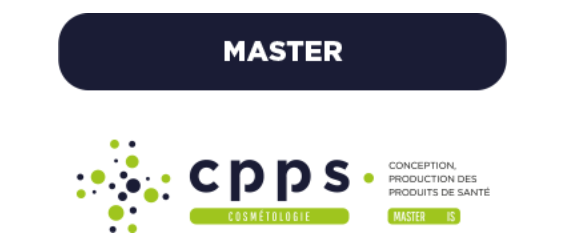CPPS cosmetology


COMPREHENSIVE TRAINING IN COSMETICS
OBJECTIVES
The aim is to train managers specializing in the design, production and regulation of healthcare products: cosmetics and dermo-pharmaceuticals, and to promote their rapid employability through academic and work-study training using an active teaching approach.
The advantages of the CPPS Cosmetology course
UNIVERSITY EDUCATION
A team of highly involved teacher-researchers specializing in the field: CM, Cours inversé, TD, TP
Sponsoring M1/M2 students
Project-based learning (APP): collaboration with a cosmetics manufacturer (M1) and on topical issues (M2)
Apprenticeship training on a schedule that maximizes time spent on the job
constant interaction with the cosmetics industry
More than 30 manufacturers took part in seminars on raw materials, regulations, marketing and packaging: Seppic, JRS, Lubrizol, Gattefossé, Lipoid, Cosmed, Oddo Conseils, Inside Cosmetics, Pierre Fabre, LaRoche Posay, Expensciences, Cosmebio, Carbios...
Company visits: Naos, Avene, SHP, L'Occitane...
Participation in the Cosmetic 360 trade show (Paris) and the JEST Cosmed day (Montpellier)
Access to the SFC (Société Francaise de Cosmétologie) network, Cosmed network. Specialized magazine subscription: CosmeticMag
Professional integration
Apprenticeships are a very effective way of getting your first job.
Alumni day to prepare for professional integration
SPECIFIC KNOWLEDGE PROVIDED BY THE COURSE
- Cosmetics product design: galenic development and scaling-up: emulsions (cream, gel cream, milk, nanoemulsion), foaming products, make-up, innovative formulations (lipid nanocapsules, liposomes, microparticles).
- Formulation controls: physicochemical and galenic, toxicological, bacteriological
- Sensory analysis and clinical evaluation
- European and international regulations
- Drafting of DIP, CPNP declaration
- Cosmetics marketing
- Operational quality assurance and continuous improvement
SPECIFIC SKILLS PROVIDED BY THE COURSE
Enable professional integration into the cosmetics industry (raw materials suppliers, manufacturers, consultants, cosmetics firms) for positions of responsibility in the regulatory, quality, marketing, R&D, formulation/control sectors.
TEACHING RESOURCES AND PROFESSIONAL EXPERIENCE
- Educational space for 3D printing in healthcare. Learning Lab, flipped courses, interactive seminars, company visits, project-based learning...
- Numerous professional guest speakers
- M1 + M2 open to apprenticeships, schedules adapted to optimize practical training
CAREER OPPORTUNITIES
REGULATORY MANAGER, QUALITY ASSURANCE I FORMULATION MANAGER, RESEARCH AND DEVELOPMENT I PROJECT MANAGER
Video: interview with a work-study studentas part of INSIDE IS ISMA


